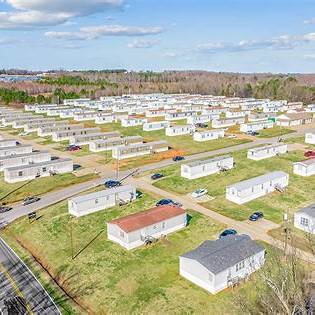In the quest for lucrative real estate investments, many gravitate toward towering urban skyscrapers, envisioning substantial returns amidst city skylines. However, a less conspicuous yet highly profitable sector warrants attention: manufactured housing communities, commonly known as trailer parks. These communities present compelling investment opportunities that often surpass traditional urban real estate ventures.

Affordability and Demand
Manufactured housing stands as a cornerstone of affordable living in the United States. With escalating housing prices, the demand for cost-effective housing solutions has surged. Manufactured homes cater to this need, offering quality residences at a fraction of the cost of site-built homes. Notably, these homes are, on average, 35-47% less expensive than traditional site-built homes, making them an attractive option for many. cambiomhc.com
Stable Occupancy Rates
The affordability of manufactured homes contributes to consistently high occupancy rates in these communities. As housing affordability becomes an increasing concern, more individuals and families are turning to manufactured housing as a viable alternative, ensuring steady demand for these properties. walkerdunlop.com
Lower Operational Costs
Investing in manufactured housing communities often entails reduced operational responsibilities compared to other real estate sectors. Residents typically own their homes and lease the land, minimizing maintenance obligations for investors. This arrangement leads to lower overhead costs and enhances the potential for stable, long-term returns. northmarq.com
Recession-Resilient Asset
Manufactured housing has demonstrated resilience during economic downturns. The inherent affordability of these homes ensures sustained demand, even when economic conditions deteriorate. This recession-resistant nature makes manufactured housing communities a reliable investment choice during uncertain times. walkerdunlop.com multifamily.loans
Chattel Financing and Land-Lease Arrangements
A distinctive feature of manufactured housing is the separation between the ownership of the home and the land it occupies. Typically, residents own the manufactured home but lease the land beneath it. This arrangement leads to several financial implications:
- Chattel Financing: Manufactured homes, when not permanently affixed to land, are often classified as personal property, or chattel. Consequently, they are financed through chattel loans, which differ from traditional mortgage financing. Chattel loans generally have shorter terms and higher interest rates compared to conventional home mortgages, reflecting the lender’s increased risk due to the home’s mobility and potential depreciation.
- Land-Lease Communities: In many manufactured housing communities, residents lease the land on which their homes are situated. This land-lease model provides a steady income stream for investors, as tenants pay rent for the land in addition to any loan payments on their homes. This structure can result in higher yields for investors, as the ongoing land lease payments contribute to consistent cash flow.
Scalability and Growth Potential
The manufactured housing industry is poised for growth, with forecasts predicting a 10-15% increase in sales over the next five years. This anticipated expansion offers investors opportunities to scale their portfolios and capitalize on the growing demand for affordable housing. cambiomhc.com

Warren Buffett’s Berkshire Hathaway owns Clayton Homes, the largest builder of manufactured housing in the U.S. Through its subsidiaries, Vanderbilt Mortgage & Finance and 21st Mortgage Corporation, Clayton provides financing options tailored to the unique nature of manufactured homeownership. While the industry has faced scrutiny over lending practices, including a 2025 lawsuit from the Consumer Financial Protection Bureau (CFPB) related to loan affordability, Berkshire’s long-term investment in manufactured housing reflects a belief in its affordability and scalability as a critical solution to the nation’s housing shortage. With continued demand for cost-effective housing, Clayton Homes remains a dominant force in the sector, shaping the future of factory-built communities. (reuters.com, apnews.com)
Advancements in Manufactured Home Quality and Scalability
The manufactured housing industry has undergone significant transformations, leading to improvements in the quality and scalability of homes:
- Enhanced Construction Standards: Modern manufactured homes are built to rigorous standards, often comparable to site-built homes. They feature durable materials, energy-efficient designs, and compliance with safety regulations, addressing past concerns about quality and longevity.en.wikipedia.org
- Design Innovations: Contemporary manufactured homes offer a variety of designs and customizable options, appealing to a broader range of consumers. These innovations have helped shift public perception, positioning manufactured homes as a viable and attractive housing alternative.
- Scalability: Advancements in manufacturing processes have enabled the production of homes at scale without compromising quality. This scalability allows for rapid development of housing communities, meeting the growing demand for affordable housing solutions.
While urban skyscrapers have traditionally symbolized real estate investment success, manufactured housing communities offer a compelling alternative. Their affordability, stable occupancy rates, lower operational costs, recession resilience, and growth potential position them as a less ostentatious asset class that remain perpetually in demand. For investors seeking sustainable and profitable ventures, manufactured housing communities present an opportunity that merits consideration. walkerdunlop.com
Is manufactured housing the best-kept secret in real estate? – AM
